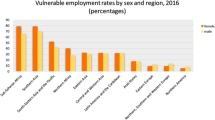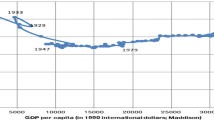Abstract
Neo-liberal economic globalisation is characterised by the removal of all trade barriers to international and domestic trade and commerce, the privatisation of all available services, resources and sectors of micro, meso and macroeconomy and unleashing of market forces for profit maximisation for capitalist expansion (Patel in Women and Structural Adjustment in India. Social Scientist, Delhi, 1994). This process has increased human, financial, economic and technological transactions and communications across countries and regions. Over the last three decades, the research studies have revealed that globalisation has accentuated inequality and poverty and has had a massive influence on the urban, rural and Dalit/tribal poor women as paid, underpaid and unpaid workers of the economy (Bakker and Silvey in Beyond states and markets: the challenges of social reproduction, Routledge, UK). As homemakers, the poor women have shouldered a disproportionate burden of commercialisation and marketisation of day-to-day survival needs such as drinking water and sanitation, degradation of environment and erosion of public health services and cash-controlled privatised education by corporate-driven economic policies (Acharya in Beyond states and markets: the challenges of social reproduction, Routledge, UK). Expensive transport and dismantling of the public distribution system that provided grains, cooking fuel, cloth material, soap, etc. have made the lives of millions of poor women full of hardship and labour intensive (Floro in Beyond states and markets: the challenges of social reproduction, Routledge, UK). International Labour Organisation’s (ILO) study on work participation of women in India has shown a massive fall in the work participation rate from 34% in 1999 to 27% in 2017 (Abraham, 2017). New robotic and automation technologies are further transforming global supply chains and production processes, putting at risk many jobs typically held by women (Bakker and Gill in Capital and Class, pp. 1–21, 2019).
Access this chapter
Tax calculation will be finalised at checkout
Purchases are for personal use only
Similar content being viewed by others
References
Abraham, V. (2017). Stagnant employment growth-last three years may have been the worst. Economic & Political Weekly., 52(38), 13–17.
Acharya, M. (2008). Global integration of subsistence economies and women’s empowerment. In I. Bakker, & R. Silvey (Eds.), Beyond states and markets: The challenges of social reproduction. UK: Routledge.
Afshar, H. (Ed.). (1985) Women, work and ideology in the third world. London: Tavistock Publications.
Ambani, M., & Birla, K. (2000). A policy framework for reforms in education. Report submitted to the prime minister’s Council on Trade and Industry. http://www.nic.in/pmcouncil/reports/education.
ANI. (2021, August 12). 15 cr children out of school at present: Union education minister. Retrieved October 12, 2021, from http://timesofindia.indiatimes.com/articleshow/85268637.cms?utm_source=contentofinterest&utm_medium=text&utm_campaign=cppst.
ASEAN. (2016). Guidelines for special economic zones (SEZs) development. Retrieved April 16, 2021, from https://asean.org/wp-content/uploads/2016/08/ASEAN-Guidelines-on-SEZ-Development.pdf.
Bakker, I., & Gill, S. (2019). Rethinking power, production, and social reproduction: Toward variegated social reproduction. Capital and Class, 1–21, https://doi.org/10.1177/0309816819880783.
Bakker, I., & Silvey, R. (2008). Social reproduction and global transformations—from the everyday to the global. In I. Bakker, & R. Silvey (Eds.), Beyond states and markets: The Challenges Of Social Reproduction. UK: Routledge.
Banerjee, N. (Ed.). (1991). Indian women in a changing industrial scenario: Indo-Dutch studies on development alternatives. New Delhi: Sage.
Burra, N. (1997). Born to work-, child labour in India. Delhi: Oxford University Press.
CAW. (2003). Committee for Asian Women, Moving Mountains-25 years of Performance, Bangkok.
Dasgupta, S., & Singh, V. (2016). Introduction. In S. Dasgupta, & V. Singh (Eds.), Transformation of women at work in Asia: An unfinished development agenda. New Delhi: Sage Publications India Pvt Ltd.
Desai, K. (2020). (2020) Exploitation and liberation: Case study of women workers in Surat’s unorganised sector. Social Change, 50(1), 12–27. https://doi.org/10.1177/0049085719901051
Desai, N., & Krishnaraj, M. (1987) Women and society in India. Delhi: Ajanta Publications.
Desai, N., & Patel, V. (1985). Indian women, change and challenge in the international decade (1975–85). Mumbai: Popular Prakashan.
Dewan, R., Sehgal, R., Kanchi, A., & Swat, R. (2019). Invisible work, invisible workers: The sub-economies of unpaid work and paid work, action research on Women’s Unpaid Labour. Delhi: UN WOMEN and ActionAid.
Dhagamwar, V. (1990). Personal Laws in India. Indian Law Institute, Delhi.
Dhagamwar, V. (1996). Obstacles to empowerment of women-culture, custom and religion in sites of change. In N. Rao, L. Kurup, R, Sudarshan, F. Ebert Stiftung (Eds.), The structural context for empowerment of women in India, New Delhi.
Economic Survey. (2021). Delhi: Government of India. Retrieved January 27, 2022, from https://www.indiabudget.gov.in/economicsurvey/doc/vol2chapter/epreface_vol2.pdf.
Everett, J., & Mira, S. (1994). (1994) Women and organisations in informal sector. Bombay: Himalaya Publishing House.
Fair Wear Foundation. (2010, September 2010). Sumangali scheme and bonded labour in India. Retrieved September 5, 2021, from http://fairwear.org/images/2010-09/fwf-india-sumangali_scheme.pdf.
Floro, M., & Hoppe, H. (2008). Towards globalization with a human face Engendering policy coherence for development. In I. Bakker, & R. Silvey (Eds.), Beyond states and markets: The challenges of social reproduction. UK: Routledge.
Frederickson, M., & Sanmiguel-Valderrama, O. (Eds.). (2018). Global women’s work––Perspectives on gender and work in the global economy (p. 422). New York.
GOI. (2008). The Unorganised Workers’ Social Security Act, 2008 Act No. 33 of 2008. Retrieved October 12, 2021, from https://legislative.gov.in/sites/default/files/A2008-33.pdf.
Goodman, J. (Ed.). (2012). Global perspectives on gender and work readings and interpretations. Maryland (US): Rowman & Littlefield Publishers Inc.
Gothoskar, S. (Ed.). (1992). Struggles of women at work. Delhi: Vikas Publishing House and IAWS.
Gupta, J. (1990). Class relations, family structure and bondage of women. In L. Dube, & R. Palriwala (Eds.), Structures and strategies—Women, work and family (pp. 129–150). Sage.
HRW. (2019, February 12). Combating sexual harassment in garment industry. Retrieved August 26, 2020, from https://www.hrw.org/news/2019/02/12/combating-sexual-harassment-garment-industry.
ILO. (2005). Report: The Other India at Work, International Labour Organisation, Delhi.
ILO. (2013). Retrieved August 25, 2020, from www.ilo.org/wcmsp5/groups/public/---dgreports/---inst/documents/publication/wcms_723274.pdf.
IRENA. (2019). Gender equality for an inclusive energy transition. Retrieved September 2, 2020, from https://www.irena.org/newsroom/articles/2019/Jan/Gender-equality-for-an-inclusive-energy-transition.
ITUC. (2016, January 15). Frontlines Report. Retrieved August 26, 2020, from www.ituc-csi.org/frontlines-report-2016-scandal.
Jain, D., & Banerjee, N. (Ed.). Tyranny of the household: Investigative essays on women’s work. Shakti Books.
Jeong, J., & Choi, S. (2001). Neoliberalism through the eyes of women. Policy & Information Centre for international Solidarity (PICIS), Korea, November.
Jhabvala, R. (1985). Closing doors: A study on the decline in women workers in the textile mills of Ahmedabad. SETU: Centre for Social Knowledge and Action.
Lessinger, J. (1990). Work and modesty: The Dilemma of women market traders in Madras. In L. Dube & R. Palriwala (Eds.), Structures and strategies—Women’s work and family, women and household in Asia-3 (pp. 129–150). Sage.
MOSPI. (2014). Men and women in India. Chapter 4: Participation in Economy, Delhi: Ministry of Statistics and Programme Implementation, Government of India. http://mospi.nic.in/sites/default/files/reports_and_publication/cso_social_statices_division/Chapter_4_2014.pdf.
Mishra, S. (2017). Social security for unorganised workers in India. Journal of Social Sciences, 53(2), 73–80. https://doi.org/10.1080/09718923.2017.1340114Accessedon29-8-2020
NCEUS. (2006). Report on conditions of work and promotion of livelihoods in the unorgnised sector. Delhi: National Commission for Enterprises in the Unorganised Sector.
NCEUS Report. (2007). Report on conditions of work and promotion of livelihoods in the unorganised sector. Delhi: National Commission on Enterprises in the Unorganised Sector. Retrieved January 27, 2022, from https://msme.gov.in/sites/default/files/Condition_of_workers_sep_2007.pdf.
New Economic Policy. (1991). Objectives, features and impacts. Retrieved January 27, 2022, from https://www.jagranjosh.com/generalknowledge/new-economic-policy-of-1991-objectives-features-and-impacts-1448348633-1.
OHCHR. (2020). Women’s human rights in the changing world of work. Retrieved August 27, 2020, from https://www.ohchr.org/EN/Issues/Women/WGWomen/Pages/WomenChangingWorldofWork.aspx.
Patel, V. (2002). Women’s challenges of the new millennium. Delhi: Gyan Publications.
Patel, V. (2009). Discourse on women and empowerment. Delhi: The Women Press.
Patel, V. (2010). Girls and girlhoods at the threshold of youth and gender: A Vacha initiative. Delhi: The Woman Press.
Patel, V. (1994, March–April). Women and structural adjustment in India (Vol. 22, No. 3 & 4, pp. 16–34). Delhi: Social Scientist.
Patel, V. (1992). Women and structural adjustment programme in India. UK: London School of Economics and Political Science, Development Studies Institute.
Patel, V. (2021, March). Gendered experiences of COVID-19: Women, labour, and informal sector. Mumbai: Economic and Political Weekly Engage. Retrieved January 27, 2022, from https://www.epw.in/node/158091/pdf.
Protection of Women from Sexual Harassment Act. (2013). POSH Act, Delhi: Legislative Department, Government of India. Retrieved January 27, 2022, from https://legislative.gov.in/actsofparliamentfromtheyear/sexual-harassment-women-workplace-preventionprohibition-and-redressal.
Rao N., Kurup L., & Sudarshan R. (Eds.). (1996) Sites of change-the structural context for empowerment of women in India. Delhi: Friedrich Ebert Stiftung, N. Delhi
Ravi Kumar, T. (2003). Downsizing higher education—An emergent crisis. Economic and Political Weekly, 38(7), 15–21.
Rodgers, G. (2011). A question of time. Indian Journal of Labour Economics, 54(1), 151–156.
Rohini, P. H., Sujata, S. V., & Neelam, C. (1983). My life is one long struggle-women. Pratishabda Publication.
Seetaprabhu, K., & Iyer, S. (2019). Human development in an unequal world. Delhi: Oxford University Press.
Shah, N., Gothoskar, S., Gandhi, N., & Chhachhi, A. (1994). Structural adjustment, feminisation of labour force and organisational strategies. Economic and Political Weekly, 29(13), 39–48.
Sharma, S. (2016). Achieving gender equality in India: What works, and what doesn’t. Geneva: United Nationals University. Retrieved April 14, 2021, from https://unu.edu/publications/articles/achieving-gender-equality-in-india-what-works-and-what-doesnt.html.
Shram Bureau. (1993). Report on Socio-economic Conditions of Women Workers in Selected Handloom and Khadi Units in Gujarat, Shram Mantralaya, Bharat Sarkar, Chandigarh\Shimla.
Shram Shakti Report. (1988). Report of the national commission on self employed women and women in the informal sector. Delhi: Government of India. Retrieved April 2, 2021, from https://indianlabourarchives.org/xmlui/handle/123456789/169.
Towards Equality Report. (1974). Report of the Committee on Status of Women in India. Delhi: Government of India. https://feministlawarchives.pldindia.org/category/towards-equality/towards-equality-towards-equality/.
UN-INSTRAW United Nations International Research and Training Institute for the Advancement of Women (UN-INSTRAW) Country reports of the developing countries. Retieved January 27, 2022, from https://uia.org/s/or/en/1100063863.
UN Committee on Economic, Social, and Cultural Rights, Sixteenth Session. (1997). Retrieved August 31, 2020, from https://www.refworld.org/docid/47a70799d.html.
UNHRC. (2020). Women’s human rights in the changing world of work Report of the Working Group on discrimination against women and girls. Retrieved April 5, 2021, from https://www.ohchr.org/EN/Issues/Women/WGWomen/Pages/WomenChangingWorldofWork.aspx.
UNICEF. (2000). Girl child—A status report: SAARC Decade for a Girl Child (1990–2000 A.D.), Delhi.
Unorganised Sector Social Security Act. (2008). Delhi: Government of India. Retrieved January 27, 2022, from https://labour.py.gov.in/sites/default/files/unorganised-workers-social-security-act-2008.pdf.
Velayudhan, M. (2020). The labour side of the story: Informalisation and new forms of mobilisation of Kerala’s women workers. Social Change, 50(1), 109–120. https://doi.org/10.1177/0049085719901079
Verick, S. (2017). Women’s labour force participation in India: Why is it so low? Geneva. Retrieved September 7, 2020, from https://www.ilo.org/wcmsp5/groups/public/---asia/---ro-bangkok/---sronew_delhi/documents/genericdocument/wcms_342357.pdf.
Vittal, N. (1977). Export processing zones in Asia: Some dimensions. Tokyo: Asian Productivity Organization. Retrieved March 19, 2021, from https://www.google.co.in/books/edition/Export_Processing_Zones_in_Asia/.
Wichterich, C. (2020). Who cares about healthcare workers? Care extractivism and care struggles in Germany and India. Social Change, 50(1), 121–140. https://doi.org/10.1177/0049085719901087
WIEGO. (2013). Informal workers and collective bargaining. Retrieved January 27, 2022, from https://www.solidaritycenter.org/wpcontent/uploads/2014/11/WIEGO.Informal-Workers-and-Collective-Bargaining.pdf.
Author information
Authors and Affiliations
Editor information
Editors and Affiliations
Rights and permissions
Copyright information
© 2022 The Author(s), under exclusive license to Springer Nature Singapore Pte Ltd.
About this chapter
Cite this chapter
Patel, V. (2022). Macroeconomic Policies, Neo-liberal Economic Globalisation and Women in the Workforce. In: Patel, V., Mondal, N. (eds) Gendered Inequalities in Paid and Unpaid Work of Women in India. Springer, Singapore. https://doi.org/10.1007/978-981-16-9974-0_2
Download citation
DOI: https://doi.org/10.1007/978-981-16-9974-0_2
Published:
Publisher Name: Springer, Singapore
Print ISBN: 978-981-16-9973-3
Online ISBN: 978-981-16-9974-0
eBook Packages: Social SciencesSocial Sciences (R0)




